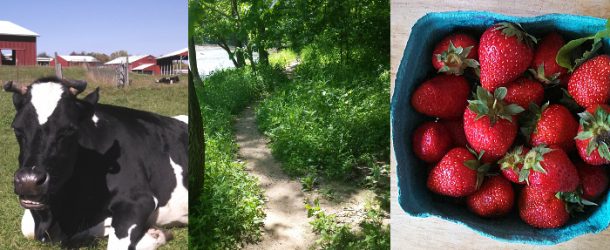“Everyone needs to be vegan right now!” It’s understandable to feel this sense of urgency. Tens of billions of animals are born into a life of misery and murder every year. Preventable lifestyle diseases are on the rise. Coping with dangerous work conditions, abuses from management, low pay, and psychological damage are the norm for slaughterhouse workers who are largely people of color, immigrants (including an unknown number of undocumented ones), and the working poor. And our beautiful earth is being destroyed. The situation is dire.
While veganism isn’t a panacea, it can have a huge impact. Learning about this impact can compel people to go vegan overnight, but many of them will fail because it is too abrupt of a change for them to adapt to all at once. They may even direct the blame for their failed attempt on cravings, iron deficiency, cost of specialty vegan foods, and more. The simple fact is that they weren’t setting themselves up for success. Successfully implementing any change in one’s life begins with one thing: the understanding of self.
Knowing, trusting in, and believing in yourself will help you set the proper pace for making changes and sticking to them. This level of intuition can be reached in many ways including meditation, self-reflection, journaling, and therapy. This is the foundation upon which everything is built.
Below are four different styles of vegan transition. A path that helps one may hinder another, depending on personality, life stage, and other factors. With these approaches in mind, I’ve witnessed and assisted people who wanted to, and did, firmly plant veganism into their lives.
•The vegan-in-training: You have your sights set on a goal, but you’re not ready to take the leap yet. You choose a starting point and outline the initial non-negotiables that you can confidently maintain. You learn as much as you can to prepare yourself for the next steps, and you move toward the goal at a pace that pushes you slightly past your comfort zone. Example: those who begin as vegetarian with the goal of becoming vegan.
•The instant vegan: You are one of those people who can make changes quickly, master them, and stick with them long-term. You thrive in high-stress situations and the uncertainty of change is exciting. Also, you may not have always been this way, but in the wake of an event like a health crisis, you feel you must choose between fight or flight, love or fear, life or death.
•The vegan after vices: You are somewhere between the vegan-in-training and the instant vegan: confident in your ability to thrive in a changing environment, but not yet willing to go all in. You can commit to something 90% at first, and the remaining 10% doesn’t put you in danger of reverting completely. Instead it is your helping hand. You need time to say goodbye to that which induces pleasurable feelings or has positive associations. Eventually, you find that you no longer want or need these vices. Ex: those who aren’t ready to give up grandma’s homemade cookies or the weekly “pizza and a movie” nights with friends, or those who wean themselves off of their cravings (like cheese) by having 1 cheat day a week until they are ready to move on.
•The maybe someday vegan: This is the most delicate of all styles because this person has not completely committed themselves to the change. The desire is present and the potential is all there, but something essential is missing within them. They may dabble in veganism for months or years, and to varied degrees, but only time will tell if they fully transition. And the magic is that the ah-ha moment can come from anywhere in a right-place-right-time way. If this type resonates with you, don’t let self-imposed judgment of your unveganness creep in. Instead be a seeker of knowledge and let your heart be your guide. If you know someone like this, pour on the encouragement, acceptance, and support.
If you’re struggling along your vegan journey and see a bit of yourself in one of these styles, use it to your advantage. The recognition that there are different ways to get to the same place can spark inspiration and provide the courage and motivation to align with your truth.


[…] Start Slow if Needed. Making changes requires a lasting commitment. That can sound scary, but it’s actually a gift. It doesn’t need to be done all at once. Resist the temptation to use this as an excuse to procrastinate, but know that you can go at your own pace. For example, say you want to go vegan for the New Year, but you aren’t ready to be vegan during an upcoming event. Instead of waiting until afterwards (because face it, there is always a “next” event), go vegan on New Year’s as planned. If the time comes and you still aren’t ready, do your (nonvegan) thing for that one event. Then, wake up the next day with a fresh commitment to veganism in your heart. For more on this, refer to the “vegan after vices” transition style in my article here. […]